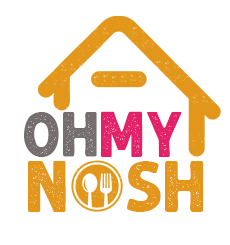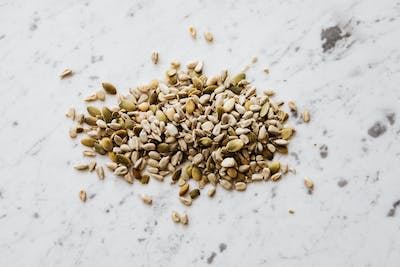When it comes to making sandwiches, one of the most popular spreads out there is peanut butter. However, some people are unable to enjoy peanut butter due to allergies or because they find it not very healthy. But did you know that aside from peanut butter, there are many other spreads out there that are also delicious and can provide you with more benefits? Yes, and we’ve listed those options in our article, What Are the Best Alternatives to Peanut Butter?
Included in that list is pumpkin butter, which contains lots of potassium, protein, fiber, and beta-carotene. When making pumpkin butter, the seeds are used. They are ground seeds mixed with salt, olive oil, and honey. In addition to being used as a bread spread, it can also be used as an ingredient to some dishes and as well as added to oats for a delicious breakfast. The benefits of pumpkin seed butter are not limited to its delicious taste. It’s because it is also good for bodybuilders, allergy-sufferers, and anyone who is looking for a healthier butter to add to their diet.
If you are wondering about the good things that pumpkin seed butter can give you, you’re in the right place. Read on as we’re giving you the benefits of pumpkin seed butter.
Pumpkin seed butter is high in minerals.
If you’re a vegan or vegetarian, you might find it challenging to meet the iron needs of your body. But when you eat a single serving of pumpkin seed butter, you can get about 30% of your daily iron requirements. In addition to that, pumpkin seed butter also provides under 20% of your daily zinc needs, which aids the body in healing wounds and regulating cell growth.
Aside from zinc, pumpkin seed butter is also rich in magnesium. It is beneficial for strong bones and healthy blood sugar levels. Along with that, it is also rich in phosphorous, manganese, potassium, and copper.
Pumpkin seed butter is good for food allergies.
Many people are allergic to peanuts and other legumes. These include almonds, hazelnut, cashew, macadamia, pistachio, walnut, and pecan. But based on the Journal of Allergy and Clinical Immunology, allergic reactions to pumpkin seeds are so rare that allergens in them had not even been studied. With this. We can say that pumpkin seed butter is safe to eat even when you have allergies to foods like peanuts.
Pumpkin seed butter is one of the best sources of protein.
Most nut and seed butter are rich in protein, but pumpkin seed butter is a standout. It’s because it has more than 30% protein compared to cashew butter and 17% more compared to almond butter.
Pumpkin seed butter boosts immunity and aids with sleep problems.
Together with the vitamins and minerals that it contains, another benefit of pumpkin seed butter is that it has phytosterols, which can help improve immunity while reducing cholesterol simultaneously. Aside from that, it also contains a decent amount of tryptophan, which can restrict stress and improve sleep. With this, it can enhance your immune system and sleeping habits that will lead to even more health benefits, like better hair and skin.
Pumpkin seed butter is low in calories.
There is actually no seed or nut butter that can be considered low-calorie, but pumpkin seed butter is among the lowest. It contains 15% fewer calories compared to cashew or almond butter. Since it has lots of nutrients, you can eat less of it to get the same benefits that you would from other nuts and seed butter. Meaning you are consuming fewer calories and getting more vitamins and minerals.
Pumpkin seed butter is a good choice for athletes.
Pumpkin seed butter is perfect for athletes due to its nutritional content, especially when it comes to protein. Aside from that, it is also rich in the amino acid L-arginine, which can improve blood flow and benefit athletic performance. It also stimulates growth hormones, which contribute to muscle growth and overall athletic abilities.
Pumpkin seed butter is a good source of vitamin K.
What makes pumpkin seed butter a healthier choice is its vitamin K content. Each ounce of pumpkin seed butter has 18% of the daily value needed by the body. Eating peanut butter, almond butter, or sunflower seed butter will not give you any vitamin K, making pumpkin seed butter a great choice. Keep in mind that vitamin K is essential when it comes to bone health and blood clotting.
Pumpkin seed butter is environmentally friendly.
Since pumpkin seed is a byproduct of pumpkins, pumpkin seed butter is more environmentally responsible for growing and cultivating. Almost every part of the pumpkin can be eaten. Therefore, when it is grown, only a little of it goes to waste. It’s true that nuts are more eco-friendly compare to other sources of protein. However, it takes a lot of water to grow nuts for nut butter compared to seed butter. Compared to other seed butter, pumpkin seed butter leaves a particularly small footprint. Thus, if you want to do good for yourself and the environment, choosing pumpkin seed butter is a great decision.
These are some of the benefits that you can get from pumpkin seed butter. There are lots of ways you can incorporate it into your diet. You can use it to make some pumpkin seed butter cups, which are like chocolate or peanut butter cups. You can also include them in filling and fun meals like smoothies and toast or use them as a dip, mixing, or topping. From its delicious taste to its health benefits, there are lots of reasons to try pumpkin seed butter.

